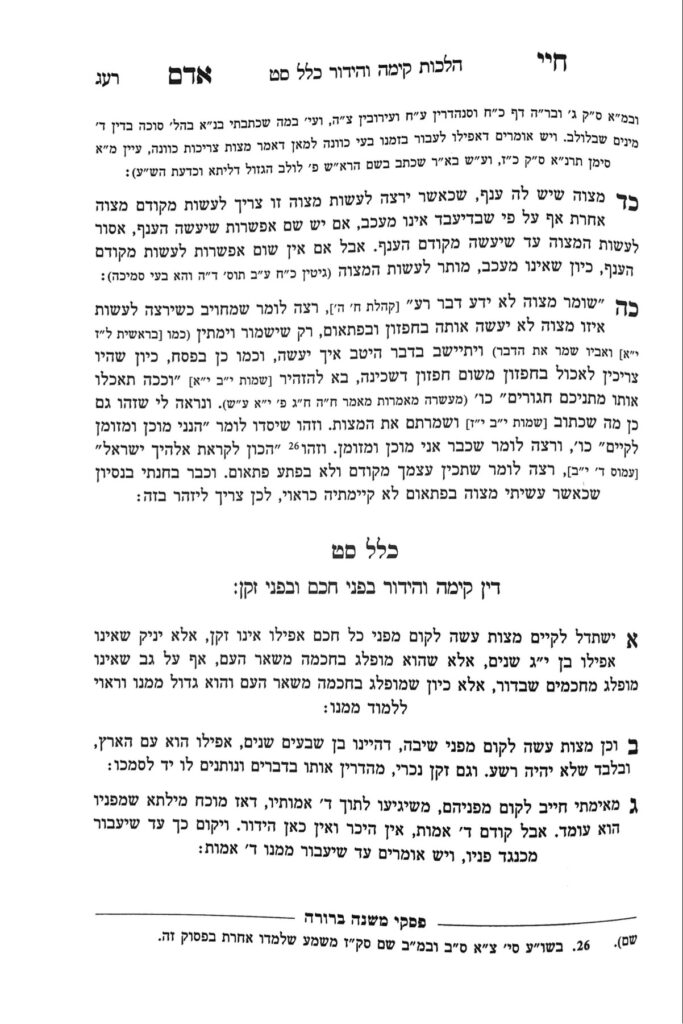We are beginning siman 2, discussing the halachos of kavod for talmidei chachamim. In siman 1, we learned that the mitzvah of standing up for someone applies to a talmid chacham even if they are not elderly. Today, we will discuss standing up for someone elderly even if they are not a talmid chacham.
The Chayei Adam writes that it is a mitzvah to stand up for someone who is a seivah, meaning they are 70 years old. The Arizal writes that the chiyuv begins from age 60, and many poskim follow the Arizal. Nonetheless, the Chayei Adam writes age 70. This chiyuv applies even if the person is an am ha’aretz, provided they are not a rasha.
The poskim discuss people nowadays who are not shomer torah u’mitzvos. The chiyuv to stand up for an am ha’aretz is because they keep mitzvos, even if they are not a talmid chacham. Even if we give the individual the status of a tinok she’nishbah (i.e., we are not faulting him for his lack of keeping mitzvos), the fact is that they are not keeping mitzvos. Many poskim assume that there is no chiyuv to stand up for such a person. However, if the person is trying their best to keep mitzvos, they would fall under the category of an am ha’aretz, and there would be a chiyuv to stand up for them.
The Chayei Adam continues, and writes that it is appropriate to help an elderly person who is not Jewish and speak to them in a way which shows respect. The Gemara explains that even though they do not keep Torah u’mitzvos, they have learned a tremendous amount about life, and deserve some element of respect.
The Chayei Adam’s language is identical to that of the Shulchan Aruch. The Bach points out that, based on the language of the Shulchan Aruch, there is not chiyuv to stand up for a non-Jew, but just to show them respect and help them. The language of the Tur is that one should stand up slightly, but the Chayei Adam follows the Shulchan Aruch.
The poskim discuss whether the chiyuv to give kavod is primarily when the elder will notice, so that the elder will receive the emotion of being given kavod, or even if the elder will not notice, and the chiyuv is for the person standing up to demonstrate the kavod, regardless of the recipient. The assumption is that regarding a talmid chacham, the chiyuv to stand up is even if the talmid chacham will not notice, because there is a chiyuv on the person standing up to demonstrate kavod hatorah. However, in regards to a non-Jew, the chiyuv is to give the non-Jew respect, so the chiyuv only applies if the non-Jew will notice.
The poskim assume that these halachos apply to an elderly woman as well. Although the Arizal seems to indicate that one should not stand up for an elderly woman, the assumption of the poskim is that these halachos apply equally.
Regarding a Jew who is elderly but an am ha’aretz, it is not clear to Rabbi Reingold whether one stands up even if the elder will not see it, as it is not clear whether they are compared to the talmid chacham or to the elderly non-Jew. On the one hand, since they are not a talmid chacham, one is not standing up to demonstrate kavod hatorah, so one could argue that the chiyuv to stand up only applies when they are aware they are receiving kavod, similar to the non-Jew. On the other hand, one could argue that since they are Jewish, they deserve inherent respect for what they have learned about yiddishkeit, so one is standing up due to the inherent kavod hatorah, and the chiyuv to stand up would apply regardless of whether the elder will notice.
Summary
- There is a chiyuv to stand up for a talmid chacham, regardless of their age. This chiyuv applies even if the talmid chacham will not notice the kavod, as there is an inherent chiyuv to demonstrate kavod hatorah.
- It is appropriate to show respect for an elderly non-Jew, by helping them and speaking respectfully to them. This chiyuv only applies if the elder will notice, as the chiyuv is primarily to demonstrate respect towards the elder.
- There is a chiyuv to stand up for an elderly Jew the age of 70 and above, even if they are an am ha’aretz, provided they try their best to keep torah u’mitzvos. It is not clear whether this chiyuv applies even if the elder will not notice. Some are machmir from age 60.



